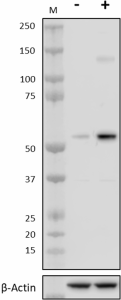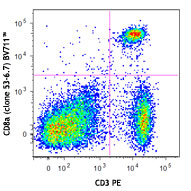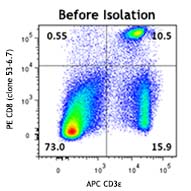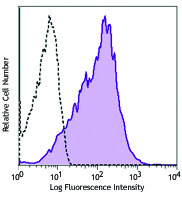- Regulatory Status
- RUO
- Other Names
- hydroxychloroquine, HCQ, chloroquine
- Ave. Rating
- Submit a Review
- Product Citations
- publications

-

Whole cell extracts (15 µg protein) from HeLa cells untreated (-) or treated (+) with 50 µM hydroxychloroquine sulfate for 18 hours were resolved by 4-12% Bis-Tris gel electrophoresis, transferred to a PVDF membrane, and probed with a purified anti-p62 antibody overnight at 4°C. Proteins were visualized by chemiluminescence detection using HRP donkey anti-rabbit IgG antibody (Cat. No. 406401). Direct-Blot™ HRP anti-β-actin antibody (Cat. No. 664804) was used as a loading control at a 1:10000 dilution (lower). Lane M: Molecular weight marker. -

HeLa cells were grown in media with 50 µM (panel B) or without (panel A) hydroxychloroquine sulfate for 18 hour. Cells were then fixed with 4% paraformaldehyde for 10 minutes, permeabilized with 0.5% Triton X-100 for 10 minutes and blocked with 5% FBS for 60 minutes. Cells were then intracellularly stained with purified anti-p62 antibody overnight at 4°C, followed by incubation with Alexa Fluor® 594 goat anti-mouse IgG antibody (Cat. No. 405326) at 1:200 dilution. Nuclei were counterstained with DAPI and the image was captured with a 60X objective.
| Cat # | Size | Price | Quantity Check Availability | Save | ||
|---|---|---|---|---|---|---|
| 427602 | 100 mg | 141€ | ||||
Hydroxychloroquine sulfate is used as an anti-malarial drug in regions where the parasite has grown resistance to chloroquine phosphate. It is a less toxic derivative of chloroquine phosphate that it known to inhibit proinflammatory cytokine levels and is being used as a treatment to decrease inflammation in autoimmune diseases such as rheumatoid arthritis and systemic lupus erythematosus. The drug is also broadly used to study autophagic pathways in eukaryotic cells, where it blocks lysosomal acidification. This decreases autophagic flux by disrupting autophagasome-lysosome fusion. Additionally, hydroxychloroquine sulfate inhibits infection by SARS-CoV-2 and other coronaviruses in vitro.
Product DetailsProduct Details
- Formulation
- Lyophilized
- Preparation
- Resuspend 100 mg of lyophilized hydroxychloroquine sulfate in 4.6 mL of ddH2O to make 50 mM stock concentration.
- Storage & Handling
- Store lyophilized powder at room temperature under desiccation. Protect from light. Once reconstituted, store at -20°C. Use reconstituted material within 3 months to avoid loss of potency.
- Application
-
Activation - Verified
- Recommended Usage
-
Treatment of cultured cells with hydroxychloroquine sulfate ranges from 10-50 μM for 12-48 hours. It is recommended that the reagent be titrated to determine optimal performance.
- Disclaimer
-
This product is for research use. It is not intended for therapeutic use or human consumption.
Antigen Details
- Biology Area
- Cell Biology, COVID-19
- Antigen References
-
- Jiang PD, et al. 2010. Biomed. Pharmacother. 64:609
- Frieboes HB, et al. 2014. JOP. 15:189.
- Levy JM, et al. 2014. Cancer Discov. 4:773.
- Wang M, et al. 2020. Cell Res. 30:269.
- Gene ID
- NA
 Login / Register
Login / Register 

















Follow Us